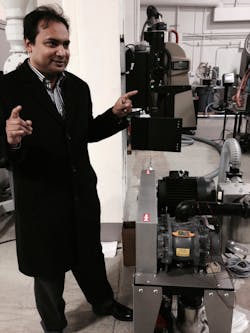MachineSense developing system to sense, screen temperature of visitors at entrances

In response to the threat posed by the coronavirus, MachineSense has begun beta testing a low-cost, infrared system that can be mounted at the entrance of a building to scan the body temperature of people seeking entry. From initial concept to beta testing took the company less than two weeks.
The FeverWarn system allows for proper social distancing because it doesn’t require an employee to interact with the person to be scanned.
According to a press release from the company, “This system would record the body temperature of every person who approaches the entrance of a retail store, factory or office, etc., and can be monitored and stored automatically. The system provides an alert if an elevated body temperature has been detected, allowing the person to be identified and isolated effectively.”
The company cited reports of some businesses designated as essential — such as factories that produce medical, defense or food products — being forced to shut down because employees contracted COVID-19 in the workplace. MachineSense envisions FeverWarn being used at such businesses to prevent entry of people showing symptoms of the disease.
MachineSense’s beta test of FeverWarn is being conducted at auxiliary equipment maker Novatec in Baltimore. Novatec has been classified as an essential manufacturing company, which allows it to continue operating during a mandatory stay-at-home order issued by Maryland Gov. Larry Hogan.
“The entire product has been developed from concept to production within two weeks using MachineSense wearable sensors with edge technology and 3-D printing from Additive Accelerator,” said Conrad Bessemer, a co-owner of MachineSense, Additive Accelerator and Novatec.
In addition to monitoring the temperature of individuals approaching an entrance, the company said FeverWarn can be used in conjunction with an app that people attempting to enter could be directed to download. If the person seeking entry triggers the elevated temperature alarm, software operating with the FeverWarn system can record the incident, and information about the person registered in the app can be forwarded to the proper authorities.
“Local authorities could enforce immediate quarantine of high-risk individuals if such actions are warranted in a city or a county,” said Biplab Pal, CTO and cofounder of MachineSense and inventor of FeverWarn.
The company also is working to produce a home version. That version would not require a visitor to ring a doorbell, because an automatic alert would sound as a person approaches the door. The system would alert the homeowner if the visitor had an elevated temperature before the door is opened.
David Tillett, copy editor
Contact:
MachineSense LLC, Baltimore, 443-457-1165, www.machinesense.com
About the Author
David Tillett
Associate Editor David Tillett writes and edits for Plastics Machinery & Manufacturing, Plastics Recycling and The Journal of Blow Molding. He covers new products, industry news, patents and consumer and business equipment. He has more than 20 years of experience in daily newspaper, online and magazine journalism.